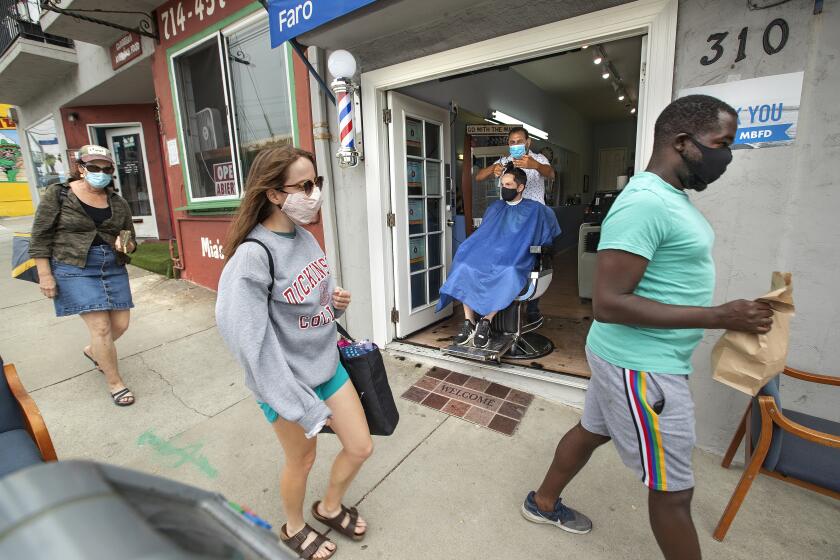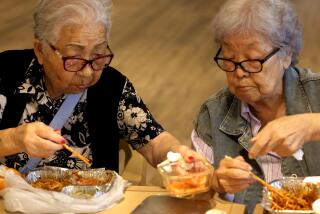Poorest seniors shut out of California’s coronavirus meal program

- Share via
To help elderly people at severe risk from the coronavirus, California launched the “Great Plates Delivered” program to bring meals from local restaurants to their homes.
In Los Angeles, city employees swung into action to enroll seniors in need. But soon they got a seemingly contradictory message: Some seniors, they were told, were too needy to qualify.
Beginning in May, L.A. officials instructed workers taking calls for the meals program that elderly people were eligible only if their incomes fell between roughly $25,000 and $75,000 for a household of one. That meant that the very poorest — those earning under $24,981 annually — could not access the new program.
Los Angeles officials pointed to guidance sent out by the state, which said that eligible participants must earn “no less than 200% of the federal poverty limit.” Other California cities and counties have cited the same rule.
The reason, state officials say, is that Great Plates Delivered is meant for seniors who aren’t accessing other nutrition programs.
The costs of the new program are reimbursed in part through the Federal Emergency Management Agency, which has mandated that the money cannot be used to assist people who are benefiting from other government programs. Among them is CalFresh, the California program for food stamps, which is limited to households earning 200% of the federal poverty limit or less.
California wants cities and counties “to serve as many individuals as could be served within this program — while being able to recoup the costs” from FEMA, said Brian Ferguson, a spokesman for the Governor’s Office of Emergency Services.
Many cities and counties have referred seniors who earn too little for Great Plates to other meal programs.
But some local officials and advocates have bristled at the restrictions, arguing that the poorest seniors aren’t necessarily enrolled in other nutrition programs. Even if they are, critics say, those programs don’t provide people as much help.
Trying to get a handle on how California is reopening and what it means for you? Our guide includes updates and tips for remaining healthy and sane.
Dozens of cities and counties have signed up to administer Great Plates Delivered, which is also meant to serve as an economic stimulus for local restaurants struggling to survive.
The program, initially slated to end in May, has since been extended through July 10. Los Angeles is extending that and other COVID-related senior meals programs through August, according to Mayor Eric Garcetti’s office. Ferguson said that more than 29,000 people across California were slated to get meals last week through the Great Plates program.
“This is a first-in-the nation program,” Ferguson said. “To pick at the details loses track of that — that this was a monumental effort that has helped feed hundreds of thousands of Californians.”
But in Berkeley, city officials complained that the new program “fails to address the needs of the lowest income members of our community.” Berkeley officials said that although the rules are based on the idea that the poorest seniors are eligible for other programs such as CalFresh, eligible people aren’t necessarily enrolled in them — and those programs don’t provide as much aid.
Meals on Wheels, for instance, “only provides one meal per day,” Berkeley officials wrote in a report. “Ironically, with the Great Plates Delivered program, higher income individuals can receive three restaurant meals per day valued at $66 per day.”
The San Diego Hunger Coalition raised similar concerns about an “inequitable approach,” warning that other food assistance programs “do not — nor are they intended to — fully meet the nutritional needs of enrolled Californians.” CalFresh provides up to $6.26 per day for an individual, while Great Plates provides up to $66 worth of meals daily, it wrote.
And in Los Angeles, some seniors get assistance such as food stamps, “but in order to utilize it they’re putting themselves at extreme risk for contracting COVID,” said Sissy Trinh, executive director of the Southeast Asian Community Alliance, which has been assisting people in Chinatown and Lincoln Heights.
In one Chinatown building, Trinh said, dozens of tenants share a single kitchen, which means they can’t stock up on lots of groceries and avoid repeated shopping trips.
In addition, Trinh said that many other seniors whose incomes should qualify them for food stamps or other aid have been stuck in bureaucratic limbo or afraid to apply.
“We started soliciting donations for meals and just paying out of pocket,” Trinh said. “We’ve spent thousands of dollars buying meals for folks that should be eligible but aren’t,” including people whose incomes were too low for Great Plates.
“It’s been a mess,” she said.
Los Angeles was already running meal programs before Great Plates was launched this spring. Laura Trejo, head of L.A.’s Department of Aging, said that during that time, more than half of the seniors enrolled were under 200% of the federal poverty limit.
When Great Plates began, the city started referring people whose incomes fell short to other meal programs and adding them to a wait list. As of Thursday, roughly 2,300 people had been put on a wait list for meals, including more than 400 seniors whose incomes were too low for Great Plates, according to the mayor’s office.
In internal messages obtained by The Times, city employees assisting with the meal program repeatedly discussed seniors not qualifying because their incomes were too low. One worker called the requirement “awful.”
Trejo described the Great Plates program as just “one aspect of our local approach to serving seniors.” Existing services without income restrictions have expanded and the city of Los Angeles is now serving an estimated 20,000 seniors through all of its meal programs, Trejo said — a huge leap from the roughly 4,500 served before the pandemic.
What is it like to get a health exam during the COVID-19 pandemic? It is different, but safe and vitally needed, given how many people are avoiding preventative care out of coronavirus fears.
Garcetti said in a statement that the city had “acted early and swiftly to protect the seniors most vulnerable to COVID-19,” and that with the help of another $25 million in federal funding to expand its meal programs, “we’ve been able to include more of our lowest-income seniors.”
A Garcetti aide said that money would be used to help the lowest income people on the wait list. L.A. officials said that so far, 42% of the seniors who have been served overall were under 200% of the federal poverty limit. Those programs could take a hit, however, if the state slashes funding for senior nutrition programs as Gov. Newsom has proposed, Trejo said.
Gary Gero, director of L.A. County’s food security branch, said that when the Great Plates restrictions were laid out, “we said, ‘This is problematic because it’s the people at the lowest end of the income level that aren’t qualified.’”
Still, Gero said, “we’ve learned to adapt” and refer people who earn too little for Great Plates to other programs, including CalFresh and L.A. County’s existing elderly nutrition program. The county program provides two meals a day, not the three covered by Great Plates, so “you have to fend for yourself for breakfast,” Gero said.
Ferguson, the Office of Emergency Services spokesman, said Great Plates had been a success. But “certainly if there’s an ability to have a more inclusive program in the future, that’s something we should look at,” he said.
Great Plates had already been facing questions about its reach. Nearly a month into the program, The Times reported that far fewer people had gotten help than Gov. Gavin Newsom had initially predicted.
Eligibility requirements were among the concerns: In Gardena, for instance, a service coordinator at a senior complex said that many residents could not participate in Great Plates because they receive CalFresh benefits — but those same residents were uneasy about going to the grocery store to use those benefits because of the COVID-19 pandemic.
Times staff writer Taryn Luna contributed to this report.
More to Read
Sign up for Essential California
The most important California stories and recommendations in your inbox every morning.
You may occasionally receive promotional content from the Los Angeles Times.













